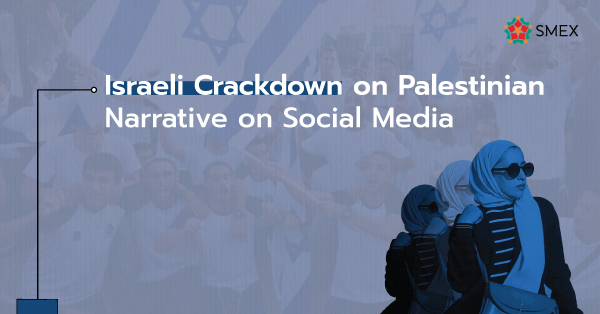As a result of Instagram’s ban on her account, Palestinian activist Samar Sao was unable to use the live broadcast feature on the app, thus preventing her from documenting the provocations by Israeli settlers during the annual flag march in the Old City.
“My (almost 48,000) followers on Instagram have restricted access to my posts, especially during major upheavals and events in occupied Jerusalem, such as the flag march,” Sao told SMEX. She added that “a group of settlers even launched an incitement campaign against me on WhatsApp to defame me and urge Israeli security forces to arrest me and interrogate me. [Whatsapp] did not take any measures to end the campaign.”
Israeli occupation forces, and right-wing Jewish and extremist religious groups, constantly harass activists on WhatsApp, Facebook, and Instagram and commit numerous violations against them. Many activists end up getting arrested to prevent them from sharing online posts that expose and document Israeli human rights violations and crimes. For example, in May, “the Israeli occupation police conducted pre-emptive arrests against more than 100 activists from occupied Jerusalem and a number of Palestinian cities to prevent them from potentially blocking the flag march,” according to Al-Araby Al-Jadeed newspaper.
The “flag march” is an annual procession organized by the Jewish religious school Merkaz Harav (Rabbi Center), in which settlers and Jewish religious extremists participate to commemorate the “reunification of Jerusalem,” following its occupation by Israel on June 5, 1967.
Last year’s “flag march” on May 29 ignited a war on social media against the Palestinian narrative which Israelis have been denying since the Nakba of 1948. It spread uncontrollably in what seemed like a coordinated attack—one led and carried out by official and unofficial Israeli parties across the digital world.
Palestinians Stand Firm
Palestinian activist Moumin Nemr from occupied Jerusalem told SMEX that Instagram restricted his account—which has nearly 60,000 followers—and banned him from posting photos and videos since early May, “in an attempt to suppress the truth and the voice of reason.”
Nemr explained that he created an alternative account as a pre-emptive measure in case his current one got suspended. He was worried that the “constant reports and violations would lead to the suspension or deletion of [his] account at any moment.” He added that he “does not want to resort to other platforms since Instagram is the most widely used among the youth, rendering it an effective tool for sharing national, political, and humanitarian messages.”
Platforms Complicit with the Occupation
Israeli occupation forces submit tens of thousands of government requests for content removal to Facebook and Google in an attempt to censor Palestinian narratives online. The Palestinian ambassador to the United Kingdom Husam Zomlot published a post on June 7 confirming this, stating that “Facebook adopts a systematic policy to obscure the truth, suppress voices, and disseminate the occupation’s narrative.”
Last year, during the “May Uprising,” Zomlot received a Facebook delegation that admitted to violations against Palestinian content, claiming that there was an “issue with their algorithms.” In his most recent post, Zomlot said that they will keep monitoring Facebook’s policy of “restricting Palestinian content and limiting its reach.” He also stated that “legal measures” will be taken in response to the issue, without specifying the prosecuting party.
Even outside Palestine, “Zionist groups and organizations supported by the Israeli government are pursuing their defamatory campaigns against Palestinians and supporters of the Palestinian cause abroad,” according to the 2022 quarterly report by 7amleh – The Arab Center for the Advancement of Social Media. The report mentioned that “these efforts led to the dismissal of five journalists and to investigations with another eight due to their support of the Palestinian cause on their personal social media accounts.”
7amleh also stated that “censorship by social media platforms is the primary challenge undermining the Palestinian people’s freedom of opinion and expression.” According to the report, “the most common practices include the deletion and restriction of accounts and pages, including restrictions on commenting, live broadcasts, posting, and content reach, as well as the removal of content.”
Documenting and Confronting Violations
Monitoring is considered to be one of the most important tools to document violations and detect and confront violation trends and types. In fact, 7amleh has monitored and documented 1,033 reports on digital rights violations, according to its 2021 annual report on the violation of Palestinian digital rights.
Mona Shtaya, advocacy advisor at 7amleh, says that the aim of this war and these violations “is twofold: first, the suppression of any content documenting violations by occupation forces or extremist settlers against Palestinians; and, second, the dissemination of Israeli content and posts inciting the killing, detention, reporting, and cursing of Palestinians.”
For instance, Shtaya indicates that 7amleh has monitored many violations against Palestinian content documenting the aggression of Israeli occupation forces and their practices against Palestinian youth, including the systematic Israeli incitement against Palestinians on social media.” One example of such practices is Instagram’s removal of a video “documenting the incitement, profanities, and insults by a group of settlers against Palestinians during the Israeli flag march a few days ago in occupied Jerusalem,” according to Shtaya.
7amleh has partnered with SMEX and other organizations through several local, regional, and international forums “to form alliances and pressure the companies that own these platforms, in order to urge them to adopt fair and unbiased policies towards Palestinians, in addition to reposting restricted content,” according to Shtaya.
Inside Palestine, 7amleh and Sada Social have been documenting violations and restrictions against Palestinian content and contacting the companies that own social media platforms to resolve these issues. The two centers have announced in two separate annual reports that they have reached partial solutions with these companies, whereby 192 posts and accounts have been restored with the help of 7amleh, and 213 accounts with the help of Sada Social.
In addition to these efforts, users are phrasing their posts in innovative and cryptic ways to circumvent the algorithms that ban Palestinian content, such as “breaking up or adding Latin letters to anned Arabic terms, i.e. ‘shahīd (martyr), muqāwama (resistance), asīr (prisoner), irhāb (terrorism), silāḥ (arms), and the names of Palestinian resistance factions,” according to Sao.
Users can reach out to 7amleh through the Palestinian Observatory of Digital Rights Violations (7or.7amleh.org) and to Sada Social through its website to report any violations against their digital rights in Palestine.



